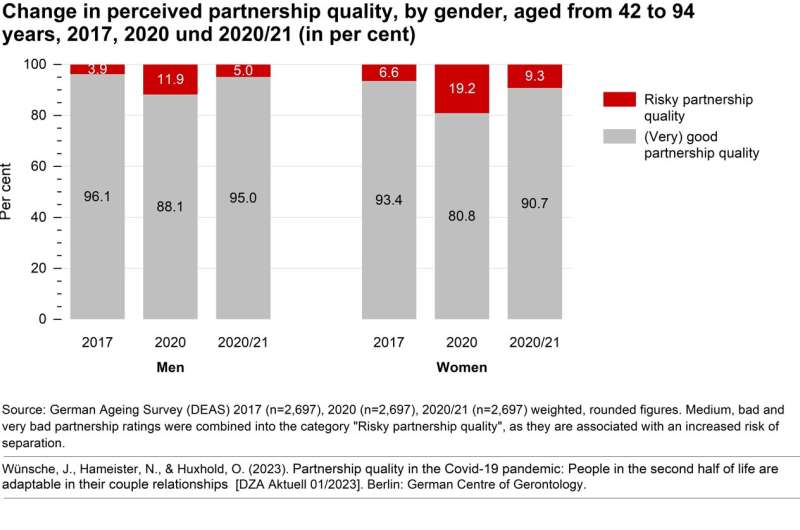This article has been reviewed according to Science X's editorial process and policies. Editors have highlighted the following attributes while ensuring the content's credibility:
fact-checked
proofread
Report: Women experienced greater loss in partnership quality than men during the pandemic

The measures to contain the COVID-19 pandemic and the challenges associated with it have temporarily put a strain on the quality of partnerships, but results of the German Ageing Survey show that already in the winter of 2020/21 people rated their couple relationship almost as good again as before the pandemic. For women, however, the losses in partnership quality were not only particularly high: they were also more persistent than in men.
Satisfying partnerships make an important contribution to avoiding loneliness and to promoting well-being and health. Data from the German Ageing Survey was therefore used to examine how people in the second half of life assess the quality of their partnership—both before and after the start of the COVID-19 pandemic.
The data from 2017, the summer of 2020 and the winter of 2020/21 were compared. Not surprisingly, in the summer of 2020, i.e. a few months after the outbreak of the COVID-19 pandemic, many people rated the quality of their own partnership more critically than before the pandemic. This can be explained by economic (e.g. job loss or short-time work), family-related (e.g. limited childcare) or social strains (e.g. contact restrictions).
The nevertheless high resilience of partnerships is shown, however, in the fact that already in winter 2020/21 the proportion of people who report a (very) good partnership quality almost returned to the level of 2017.
It is striking that women already rated their partnership quality less well than men before the pandemic and that this trend intensified further at the beginning of the pandemic: While 88.1% of men rated their partnership as good or very good in summer 2020, this was only true for 80.8% of women.
But that's not all: in the winter of 2020/21, men returned to their pre-pandemic level of partnership quality more frequently than women. While 95.0% of men viewed their own partnership positively again in winter 2020/21, only 90.7% of women came to a good or very good partnership assessment by this time.
A tendency towards re-traditionalization of gender roles—which was often discussed in connection with the COVID-19 pandemic—could explain the unequal development among men and women. The increased need for care work, due to day-care closures and temporary restrictions to inpatient and outpatient care, was fulfilled more by women than by men. This may also have contributed to increasing gender differences in perceived partnership quality that went beyond the initial pandemic shock.
Considering that satisfying partnerships are a significant source of health and well-being, these findings provide important clues to the importance of an equal distribution of care work in couple relationships and families—in general but also in times of crisis.
More information: Report: Partnership quality in the COVID-19 pandemic: People in the second half of life are adaptable in their couple relationships
Provided by Deutsches Zentrum für Altersfragen





















